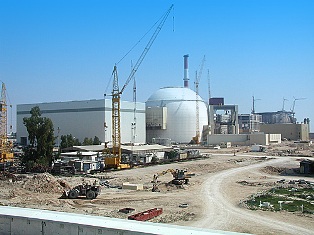Bushehr operational by March 2010, Iran says
17 December 2008
Iran's Bushehr nuclear power plant, whose construction is nearing completion by Russia contractors, will become operational no later than March 2010, an Iranian official has said.
 |
| Construction of Bushehr (Image: ASE) |
Alaeddin Boroujerdi, chairman of the Iranian Foreign Policy and National Security Committee, said the plant will be commissioned during the next Iranian calendar year (March 2009 to March 2010). He added that doubts about the plant going into operation seem to have been removed.
A year ago, Russian contractor AtomStroyExport (ASE) reported that Moscow and Tehran had reached agreement on a schedule for completing construction of Bushehr. "I promised to verify the timeframe for the construction of the Bushehr nuclear plant, but I can say with certainty that the plant will not be commissioned before the end of 2008," said ASE director Sergey Shmatko.
In February, representatives from AtomStroyExport (ASE) and 20 other Russian contractor companies met with their Iranian customers at the site of the Bushehr plant to discuss progress on the first unit at the plant and its commissioning. It was noted that construction was almost complete, financing problems had been resolved, most equipment had already been delivered, and the initial fuel load was now being stored on-site.
It is not clear whether the commissioning date announced by Boroujerdi falls within the schedule agreed between Russia and Iran. The project has repeatedly been hit with delays. The 1000 MWe pressurized water reactor was originally scheduled to begin operation in late 2006, but that was subsequently revised with the completion of construction set for September 2007; first power at the end of that year; and commercial operation around March 2008. The completion of construction date was later put back to the first half of 2008.
Boroujerdi noted that the Russians are trying to accelerate commissioning of the Bushehr plant, adding that hundreds of Iraniun engineers, trained by Russia, were now replacing some of the Russian staff.
Concerns continue
However, other elements of Iran's nuclear program remain a concern. A group of foreign ministers and envoys representing Saudi Arabia, the United Arab Emirates (UAE), Bahrain, Egypt, Jordan and Iraq have said that they want to meet regularly with the six international powers - the USA, Russia, China, the UK, France and Germany - trying to ensure that Iran's nuclear program remains peaceful. The representatives of the Arab countries met with the six nations to discuss their concerns, particularly of Iran's uranium enrichment program.
US Secretary of State Condoleezza Rice said after the meeting, "All there expressed their concern about Iran's nuclear policies and its regional ambitions." Referring to the Arab participants in the meeting, she said: "I think what really did come through here is that these are countries that have very deep interests in how this issue is resolved."
Rice added, "Noting the utility of the consultations, the states present agreed that they want to continue their meetings on a regular basis."
The United Nations Security Council has authorized a series of sanctions against Iran over its failure to suspend its uranium enrichment activities. Iran maintains that its nuclear program is entirely peaceful and does not fall under the Security Council's remit.
"I think there is a concern that there will need to be a way to finally incentivize Iran to make a different choice concerning its nuclear ambitions, but this is not an effort to develop a common strategy," Rice replied when asked if further sanctions against Iran were needed.